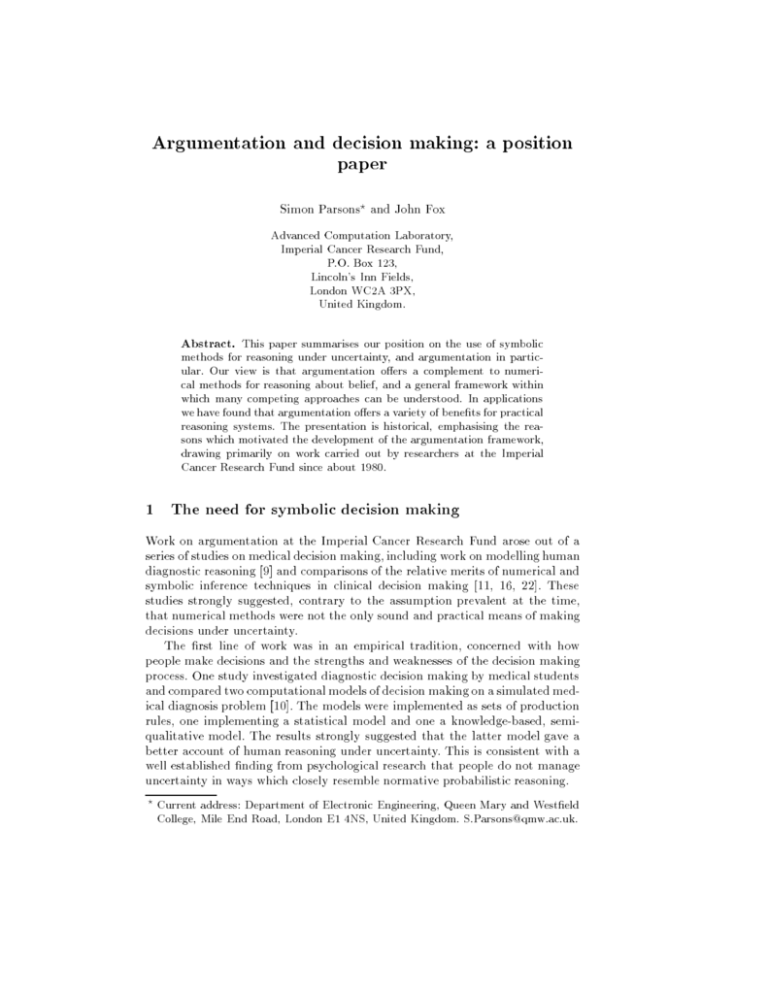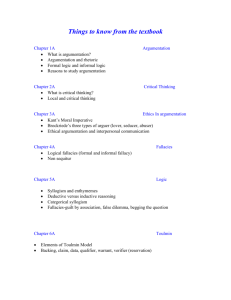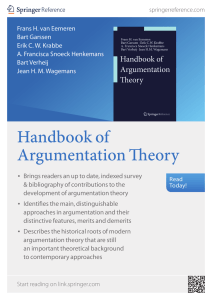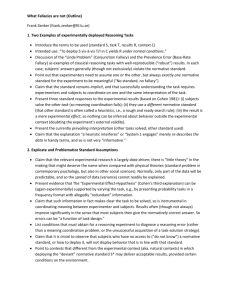Argumentation and decision making: a position paper
advertisement

Argumentation and decision making: a position
paper
Simon Parsons? and John Fox
Advanced Computation Laboratory,
Imperial Cancer Research Fund,
P.O. Box 123,
Lincoln's Inn Fields,
London WC2A 3PX,
United Kingdom.
Abstract. This paper summarises our position on the use of symbolic
methods for reasoning under uncertainty, and argumentation in particular. Our view is that argumentation oers a complement to numerical methods for reasoning about belief, and a general framework within
which many competing approaches can be understood. In applications
we have found that argumentation oers a variety of benets for practical
reasoning systems. The presentation is historical, emphasising the reasons which motivated the development of the argumentation framework,
drawing primarily on work carried out by researchers at the Imperial
Cancer Research Fund since about 1980.
1 The need for symbolic decision making
Work on argumentation at the Imperial Cancer Research Fund arose out of a
series of studies on medical decision making, including work on modelling human
diagnostic reasoning [9] and comparisons of the relative merits of numerical and
symbolic inference techniques in clinical decision making [11, 16, 22]. These
studies strongly suggested, contrary to the assumption prevalent at the time,
that numerical methods were not the only sound and practical means of making
decisions under uncertainty.
The rst line of work was in an empirical tradition, concerned with how
people make decisions and the strengths and weaknesses of the decision making
process. One study investigated diagnostic decision making by medical students
and compared two computational models of decision making on a simulated medical diagnosis problem [10]. The models were implemented as sets of production
rules, one implementing a statistical model and one a knowledge-based, semiqualitative model. The results strongly suggested that the latter model gave a
better account of human reasoning under uncertainty. This is consistent with a
well established nding from psychological research that people do not manage
uncertainty in ways which closely resemble normative probabilistic reasoning.
?
Current address: Department of Electronic Engineering, Queen Mary and Westeld
College, Mile End Road, London E1 4NS, United Kingdom. S.Parsons@qmw.ac.uk.
Classical decision theorists have strongly criticised human judgement precisely on the grounds that people do not comply with the requirements of probability theory. In contrast some cognitive scientists have questioned the force of
this observation by emphasising the exibility and other virtues of human reasoning (e.g. [24]). This observation was reinforced by a study which investigated
the performance of an expert system based on a model of human reasoning [11].
In a realistic diagnostic problem in gastroenterology it was found that the diagnostic accuracy of the expert system was very similar to that of a Bayesian
diagnostic system though the expert system achieved this level of performance
using only half the information provided to the probabilistic system.
Other empirical studies suggest that, notwithstanding the quantitative precision of probabilistic evidence analysis, much practical medical decision making
can be successfully carried out without precise numerical data. For example [16],
a rule-based system for leukaemia diagnosis was developed using the EMYCIN
expert system shell. The accuracy of the system, as compared with the decisions
of a domain expert, was 64%. When the CFs were limited to just two values,
1.0 or 0.5 (loosely \certain" or \uncertain") a 5% increase in correct diagnoses
was observed! In another study, decision making using a semiqualitative decision
procedure was compared with a probabilistic procedure using data regarding the
admission of 140 patients to a coronary care unit. It was found that the symbolic
decision model performed at least as well as the probabilistic model as determined by an ROC analysis [22]. Other independent studies have conrmed the
nding that practical decision making can be carried out successfully without
depending upon precise quantitative data (e.g. [4]).
2 A model for reasoning under uncertainty
Having established these results, the motivation for further work was an interest
in building decision support systems which would have a number of advantages
over conventionally available technologies:
{ They would not depend upon the availability of objective statistical data
(which are frequently not available in complex domains like medicine)
{ They could make use of other kinds of reasoning than statistical inference
(e.g. causal, functional and temporal reasoning) which might be more intuitive than quantitative reasoning.
{ They could support all phases of decision making, not just evidence analysis,
such as recognising when a decision is needed, what the decision options are,
what information is relevant to the choice and so forth.
An initial framework for \symbolic decision theory", using rst-order logic for
much of the deductive reasoning required and argumentation for the management of uncertainty, was proposed [12, 14], and evidence for the practicality of
the theory came from its use in the Oxford System of Medicine (OSM) [13].
This is a decision support system aimed at general practitioners which provides
a generic decision procedure for a range of medical decision tasks. Evidence
that the symbolic decision theory is very versatile comes from the wide range of
possible applications that have now been developed [8].
In addition, however, it was agreed, in accordance with the view generally
held by decision theorists, that any decision procedure which is to be used for
practical applications, particularly those like medical applications which have
safety implications, must be given a sound theoretical underpinning. While the
symbolic approach might be \inspired" by observations of human exibility,
people make mistakes and it is clearly not desirable to emulate those mistakes!
3 Formalising the model
The most contentious element of symbolic decision theory is the use of argumentation as the basic framework for reasoning under uncertainty. The central idea
in argumentation is that of a tentative proof of a proposition. The fact that a
proposition can have arguments for and against it suggests a divergence between
argumentation and classical rst order logic in which propositions are true or
false. Furthermore, as pointed out in [2], argumentation has many commonalities
with intuitionistic logic, suggesting that argumentation might be given a sound
basis in category theory since this is possible for intuitionistic logic. The rst
steps in providing this basis are detailed in [2] which identies the structure of
the space of arguments, along with the kind of operations possible over them.
The rest of the formalisation is provided in [1], which also highlights the link
between argumentation and Dempster-Shafer theory.
With this semantics in mind, it is possible to dene a logic LA in which the
consequences of a database are a set of arguments, and this is the subject of [3]
and [19]. In this work logical formulae are augmented with their proofs and when
formulae are combined, the proofs are handled in an appropriate manner. This
means that it is possible to determine the validity of formulae derived in the logic
based upon the strength of the arguments for and against individual formulae,
and that the way in which this is done is in accordance with the categorytheoretic semantics. This process has been automated in the Argumentation
Theorem Prover [20], and a summary of the formal model is recorded in [18].
4 A general model of reasoning
In addition to the arguments for argumentation as a symbolic model of decision
making, we can argue [15] that it is a model of \practical reasoning" of the kind
that humans indulge in every day. It captures many of the modes of commonsense
reasoning|nding support for ideas, attacking other ideas, and trying to attack
the support of other ideas. It handles contradictions, and should also enable the
resolution of conicting arguments at the meta-level. Furthermore, there is a
strong case that argumentation provides a general framework for unifying many
methods for reasoning under uncertainty, such as possibility and probability [23]
theories. In this role argumentation is less a formalisation of human reasoning
than a tool that can enable the use of other formalisms. Argumentation provides
a general way of combining logical reasoning with Bayesian probability by using
it to construct a network of inuences between relevant variables. Indeed, argumentation is suciently general as to underlie symbolic as well as quantitative
formalisms [21].
However, it is possible to do more with argumentation than just provide a
framework for using established formalisms, instead, as is discussed in [6], it is
possible to handle inconsistent information. That is, it is possible to have certain
arguments for both a proposition p and its negation :p. This inconsistency
enables LA to provide a ranking over the propositions for which arguments may
be proposed. In particular, arguments for propositions are allocated dierent
classes of acceptability [5, 7], the allocation depending on factors such as whether
an argument is based on a consistent database or whether there are any counterarguments. This approach can be used to give a purely logical approach to
uncertainty that ranks propositions only on the structure of the arguments for
them, and it can be augmented by the use of preference relations over subsets
of the database.
5 Summary
To summarise, empirical evidence for the usefulness of a symbolic theory of
decision making has led to the development of a formal model based on rstorder logic combined with the use of argumentation for handling uncertainty.
The versatility of the model is suggested by its wide practical applicability, while
the justication for the use of argumentation is based upon its proven practical
exibility and its well-developed formal semantics.
References
1. Ambler, S. (1992) A categorical approach to the semantics of argumentation, Technical Report 606, Department of Computer Science, Queen Mary and Westeld
College.
2. Ambler, S. and Krause, P. (1992) Enriched categories in the semantics of evidential reasoning, Technical Report 153 Advanced Computation Laboratory, Imperial
Cancer Research Fund.
3. Ambler, S. and Krause, P. (1992) The development of a \Logic of Argumentation",
Proceedings of the International Conference on Information Processing and the
Management of Uncertainty, Palma.
4. Chard, T. (1991) Qualitative probability versus quantitative probability in clinical
diagnosis: a study using a computer simulation, Medical Decision Making, 11, 38{
41.
5. Elvang-Gransson, M. and Hunter, A. (1993) Argumentative logics|reasoning
with classically inconsistent information, Data and Knowledge Engineering, 16,
125{145.
6. Elvang-Gransson, M., Krause, P. and Fox, J. (1993) A logical approach to handling uncertainty, Proceedings of the Workshop on Modelling Problems in Control
and Supervision of Complex Dynamic Systems, Lyngby, Denmark.
7. Elvang-Gransson, M., Krause, P. and Fox, J. (1993) Dialectic reasoning with
inconsistent information, Proceedings of 9th Conference on Uncertainty in Articial
Intelligence, Washington, D. C.
8. Fox, J. (1996) A unied framework for hypothetical and practical reasoning (2):
lessons from clinical medicine, Proceedings of the International Conference on Formal and Applied Practical Reasoning, (this volume).
9. Fox, J. (1987) Making decisions under the inuence of knowledge, in Modelling
Cognition, P. Morris ed., John Wiley & Sons Ltd.
10. Fox, J. (1980) Making decisions under the inuence of memory, Psychological Review, 87, 2, 190{211.
11. Fox, J., Barber D., and Bardhan, K. D. (1980) Alternatives to Bayes? A quantitative comparison with rule-based diagnostic inference, Methods of Information in
Medicine, 19, 210{215.
12. Fox, J., Clark, D. A., Glowinski, A. Gordon, C. and O'Neil, M. J. (1990) Using predicate logic to integrate qualitative reasoning and classical decision theory,
IEEE Transactions on Systems, Man and Cybernetics, 20, 347{357.
13. Fox, J., Glowinski, A. Gordon, C. Hajnal, S. and O'Neil, M. (1990) Logic engineering for knowledge engineering: design and implementation of the Oxford System
of Medicine, Articial Intelligence in Medicine, 2, 323{339.
14. Fox, J., Glowinski, A. J., O'Neil, M. J. and Clark, D. A. (1988) Decision making
as a logical process, Proceedings of Expert Systems '88, Cambridge.
15. Fox, J., Krause, P. and Ambler, S. (1992) Arguments, contradictions and practical reasoning, Proceedings of the European Conference on Articial Intelligence,
Vienna.
16. Fox, J., Myers, C. D., Greaves, M. F., and Pegram, S. (1985) Knowledge acquisition
for expert systems: experience in leukemia diagnosis, Methods of Information in
Medicine, 24, 65{72.
17. Fox, J., O'Neil, M., Glowinski, A. J. and Clark, D. (1988) A logic of decision
making, Illinois Interdisciplinary Workshop on Decision Making, Urbana, Illinois.
18. Krause, P., Ambler, S., Elvang-Grannson, M. and Fox, J. (1994) A logic of argumentation for reasoning under uncertainty, Computational Intelligence, 11, 113{
131.
19. Krause, P., Ambler, S. and Fox, J. (1993) The development of a \Logic of Argumentation", in Advanced Methods in Articial Intelligence, B. Bouchon-Meunier,
L. Valverde and R. R. Yager eds., Springer-Verlag, Berlin.
20. Krause, P., Ambler, S. and Fox, J. (1993) ATP user manual, Technical Report 187,
Advanced Computation Laboratory, Imperial Cancer Research Fund.
21. Krause, P. J., Fox, J. and Ambler S. (1992) Argumentation as a unifying concept
for reasoning under uncertainty, Technical Report 166, Advanced Computation
Laboratory, Imperial Cancer Research Fund.
22. O'Neil, M. and Glowinski, A. (1990) Evaluating and validating very large
knowledge-based systems, Medical Informatics, 3, 237{251.
23. Parsons, S. (1996) Dening normative systems for qualitative argumentation, Proceedings of the International Conference on Formal and Applied Practical Reasoning, (this volume).
24. Shanteau, J. (1987) Psychological characteristics of expert decision makers, in Expert Judgement and Expert Systems, J. Mumpower ed., NATO ASI Series, vol F35.






